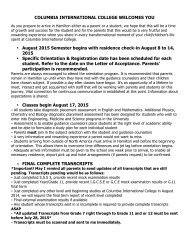french
Create successful ePaper yourself
Turn your PDF publications into a flip-book with our unique Google optimized e-Paper software.
Examples<br />
French Grammar • Print version • audio (info •113 kb • help)<br />
Gender of Nouns Genre des Noms<br />
Masculine<br />
le cheval the horse -age<br />
le chien the dog -r<br />
le livre the book -t<br />
le bruit the noise -isme<br />
Feminine<br />
la colombe the dove -ie<br />
la chemise the shirt -ion<br />
la maison the house -ite/-ité<br />
la liberté liberty -nce<br />
Common Endings Used<br />
With Masculine Nouns:<br />
le fromage<br />
the cheese<br />
le professeur<br />
the teacher<br />
le chat<br />
the cat<br />
le capitalisme<br />
capitalism<br />
Common Endings Used<br />
With Feminine Nouns:<br />
-nne<br />
-mme<br />
-lle<br />
la boulangerie<br />
the bakery<br />
la nation<br />
the nation<br />
la fraternité<br />
brotherhood<br />
la balance<br />
the scales<br />
la fille<br />
the girl<br />
l’indienne<br />
the Indian<br />
Unfortunately, there are many exceptions in French which can only be learned. There are even words that<br />
are spelled the same, but have a different meaning when masculine or feminine; for example, un livre (m)<br />
means a book, but une livre (f) means a pound! Some words that appear to be masculine (like la photo,<br />
which is actually short for la photographie) are in fact feminine, and vice versa. Then there are some that<br />
just don't make sense; la foi is feminine and means a belief, whereas le foie means liver. To help overcome<br />
this hurdle which many beginners find very difficult, be sure to learn the genders along with the words.<br />
Definite and indefinite articles<br />
The definite article<br />
In English, the definite article is always “the”.<br />
In French, the definite article is changed depending on the noun's:<br />
1.<br />
2.<br />
3.<br />
Gender<br />
Plurality<br />
First letter of the word<br />
There are three definite articles and an abbreviation. "Le" is used for masculine nouns, "La" is used for<br />
feminine nouns, "Les" is used for plural nouns (both masculine or feminine), and "L' " is used when the




